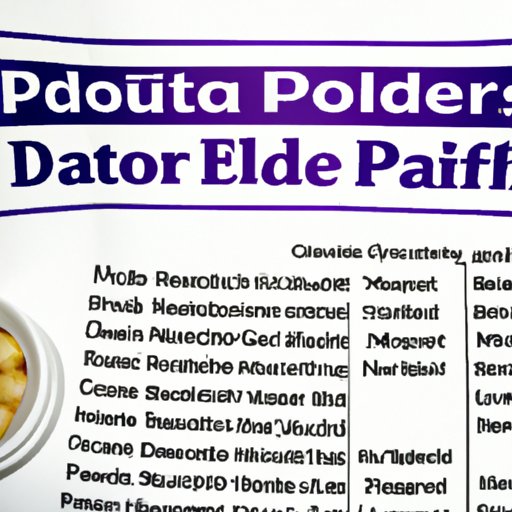Introduction
Medicare Part D is a federal program that provides coverage for prescription drugs to those who are enrolled in Medicare. This program helps seniors and other Medicare beneficiaries manage their healthcare costs. However, there is an aspect of the program known as the “donut hole” that can be confusing and costly for those enrolled in Part D plans.
Definition of Medicare Part D Donut Hole
The Medicare Part D Donut Hole is a gap in coverage where seniors must pay more out-of-pocket costs for their medications. This gap occurs when the total cost of prescriptions reaches a certain amount, called the Initial Coverage Limit (ICL). After the ICL is reached, seniors must pay more for their medications until they reach the threshold of the Catastrophic Coverage Limit (CCL). At this point, Medicare will begin to cover most of the costs for the remainder of the year.

Overview of How it Affects Seniors
For seniors living on a fixed income, the donut hole can have a significant impact on their budget. According to a study conducted by the Kaiser Family Foundation, seniors in the donut hole spent an average of $1,824 out-of-pocket in 2018. This is more than double the amount spent by seniors who did not enter the donut hole.

Explanation of the Medicare Part D Donut Hole
How It Works
The donut hole begins when the total cost of prescriptions reaches the Initial Coverage Limit (ICL), which is set by Medicare each year. For 2020, the ICL is $4,020. After the ICL is met, seniors must pay 25% of the cost of generic drugs and 37% of the cost of brand-name drugs until the Catastrophic Coverage Limit (CCL) is reached. The CCL for 2020 is $6,350. Once the CCL is reached, Medicare will cover most of the costs for the remainder of the year.
Implications for Senior Citizens
The donut hole can have a significant impact on seniors’ budgets. Many seniors may not be able to afford the higher out-of-pocket costs associated with the donut hole, and could face difficulty affording their necessary medications. In addition, the donut hole may cause seniors to delay or skip important treatments due to financial constraints.
Pros and Cons of the Medicare Part D Donut Hole
Advantages
One advantage of the donut hole is that it encourages seniors to use generic drugs and shop around for the best prices. Since seniors must pay more out-of-pocket costs in the donut hole, they may be motivated to find the cheapest options available. In addition, the donut hole provides a limit on total spending for prescription drugs, which can help seniors manage their healthcare budgets.
Disadvantages
One disadvantage of the donut hole is that it could lead to seniors skipping important treatments due to the high out-of-pocket costs. This could have serious implications for seniors’ health and wellbeing. In addition, the donut hole may cause seniors to delay filling prescriptions or switch to cheaper medications, which could lead to poorer health outcomes.

Strategies to Avoid the Medicare Part D Donut Hole
Utilizing Discount Programs
Seniors can take advantage of discount programs offered by pharmacies and other organizations to help reduce the cost of their medications. Many pharmacies offer discounts for seniors, and some organizations provide assistance with prescription drug costs. Additionally, seniors can use online tools to compare prices and find the best deals available.
Choosing Generic Drugs
Generic drugs are usually much cheaper than brand-name drugs, so choosing generic medications can help seniors save money. Most generic drugs are just as effective as brand-name drugs, so seniors should talk to their doctor about using generic drugs whenever possible.
Shopping Around For Prescription Drugs
Seniors should shop around for the best prices on their medications. Different pharmacies may have different prices for the same medications, so it’s important to compare prices before filling a prescription. Additionally, seniors should ask their doctor if there are less expensive alternatives to the medications they are prescribed.
Taking Advantage of Special Enrollment Periods
Seniors should take advantage of special enrollment periods to switch to a Part D plan with lower out-of-pocket costs. These special enrollment periods occur throughout the year and allow seniors to switch plans without penalty. Seniors should compare plans to find one that best meets their needs and offers the lowest out-of-pocket costs.
Conclusion
The Medicare Part D Donut Hole can have a significant impact on seniors’ budgets. The donut hole limits coverage for prescription drugs and requires seniors to pay higher out-of-pocket costs. However, seniors can take advantage of strategies such as utilizing discount programs, choosing generic drugs, shopping around for prescription drugs, and taking advantage of special enrollment periods to help minimize their out-of-pocket costs.
(Note: Is this article not meeting your expectations? Do you have knowledge or insights to share? Unlock new opportunities and expand your reach by joining our authors team. Click Registration to join us and share your expertise with our readers.)
